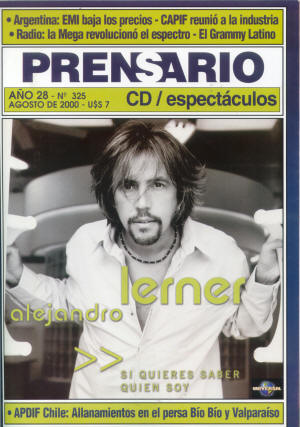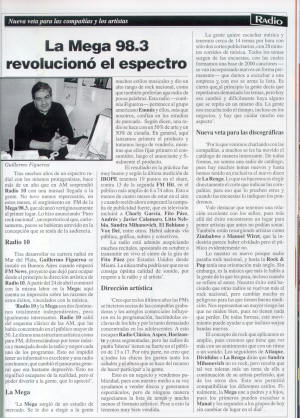Mega 98.3 Buenos Aires
Argentina 1999 |
|
Press Comments |
Mega went on the air
in late April of 2000. It was an instant success. Here are some
interesting comments form the local press, including what
leading daily Clarín said about Mega on July 28, 2000. |
|
With the success of Mega FM and the comeback of Sui Generis,
national rock again becomes a musical emblem. Nostalgia takes over
again, like in the time of the Malvinas War and during the boom
years of "Tango Feroz." It's just that now, our native rock has
become the new folk music that unites the family and where anything
goes, whether an early rock 'n roll song or a ballad. What's behind
the unanimous success of Mega and to what extent can the myths and
the dinosaurs return to the battle? |
|
"An American company
discovered that Argentines like national rock!" |
|
First was the Malvinas War, when music in
English was prohibited. Then the Tango Feroz boom brought back the
mythical Cave. Now FM Mega has made national rock in a new form of
folk music for the year 2000. Incredible!!
It's certainly
happened to you: you get on a bus, and you hear "Imágines Paganas"
and then you hear "La Balsa." You get off and the sound of "Sin
Documentos" continues from the radio in a newspaper stand, and at
the laundry, it's the Enanitos Verdes' turn, and you hear it echoed
from several taxis waiting for the light to turn green. In Buenos
Aires, Argentine Rock is part of the weather, (surrounding us) like
air. One thing is responsible: the new FM Mega 98.3 which, since
April 23, has not stopped broadcasting national rock, nothing but
national rock, 24 hours a day. Its three slogans tell us clearly
what this is all about: "Pure National Rock," "More Music, Less
Talk, " and "The first Station in Your Language."
It's a fact that
Mega is now rated first in the group of listeners between 20 and 50
years of age, and second in the 12-20 target. If any musical
phenomenon is remembered form this year, otherwise devoid of
surprises, it's the canonization of the so-called National Rock as
another banner to be stored in the case that displays the flags of
the Tango and our Folkloric music. Messages (you hear on the) radio
like, "I love the station. I'm listening with my father and I'd like
you to play the new La Renga song again." all talk about a year 200
kind of rock that is easy to listen to and has no generational split
on the horizon.
"The project is
to make the Mega brand so identified with national rock that it is
like the way Gillette is identified with razor blades," says
Guillermo Figueroa, the Program Director of the FM station. Last
Sunday, in the Viva supplement (In Clarín), Alejandro Lerner pointed
out the fundamental paradox in this boom of nationalism: "it had to
be an American company that came, did a market analysis and said
that they had to play Argentine music." The company is called Emmis
(Truth in Hebrew) and is an international multimedia company that
has stations in the US since the 70's and now has moved into Hungary
and Argentina by buying the package of Radio 10 and FM News (Today
Mega). |
|
"The Sun of National
Rock Shines Again" |
|
So, Mega programs more than
1,000 songs over and over, the same songs that were selected by 100
persons. In a previous test, over 67% of the public indicated
national rock as their favorite style among 16 possible options,
among which were also tango, Latin music and tropical. According to
Maximiliano Ré, Music Director of Mega, the idea is to have each
hour be a parade of all kinds and styles that exist in national
rock. Even if La Renga back-to back with César Banana Puerredon
(sound) on the sweet and sour side.
The case of (rock
band) La Renga is typical: the group prereleased to Mega its new
single "La vida, Las Mismas Calles" from its long and much awaited
new record. "The company decided it, and since it's a station that
only plays national rock, it seemed good to us." explained Si Gaby,
the manager of the group. You'd have to take into account that the
station is rabidly number one and does not work with the traditional
record company arrangements. "Our policy is not to be held prisoner
to the record company deals, because we don't like announcers who
say bitchy things about the music they have to play, like the ones
on Rock & Pop, for example." The competition, of course, is
listening: Metro, recently acquired by Rock & Pop, expects a future
filled with local rock and FM Supernova just inaugurated a daily
strip program dedicated to local music. |
 |
 |
|
Click on either page for full size image |
|
A Buenos Aires
website, Luna.com, published this report. |
|
Las canciones que sabemos todos.
La
FM Mega, que pasa sólo rock argentino, es la más escuchada. Las
discográficas editan CDs de Sumo o Virus y a fin de año Sui Generis
tocará en River. Más que una moda, una música que se quedó en el
corazón de varias generaciones desde que Spinetta fue descubierto
por la mítica revista nacional Expreso Imaginario.
Tócala de nuevo, Sam.” La célebre frase que nunca dijo Humphrey
Bogart en el film Casablanca bien podría convertirse en el emblema
de la FM Mega 98.3, la radio que desde abril pasa sólo los temas del
rock nacional, está primera en audiencia y provoca, una vez más, el
renacimiento de la música que desde La balsa en el ‘67 no para de
reinventarse.
Si en 1982 la guerra de Malvinas, con su prohibición de la
música en inglés, y en el ‘93 la película Tango feroz (ver recuadro)
dispararon la fiebre por el rock en castellano, parece que en 2000
otro fenómeno vuelve a lanzar el neorrockerismo local, para noticia
de los empresarios sorprendidos de que a los argentinos les gustan
Charly García o Los abuelos de la nada.
“La radio es producto de
un estudio de mercado”, afirma Guillermo Figueroa, director de
programación de Emmis, la multinacional norteamericana que compró
Radio 10 y FM News, desde el 24 de abril rebautizada Mega.
Detrás de un éxito sólo hay una encuesta: el 60 por ciento de
las personas de entre 15 y 50 años que fueron consultadas sobre
distintos estilos musicales eligió al rock nacional como su
preferido. “En función de esto se armó Mega, con 14 temas, 2 cortes
comerciales y casi 30 minutos corridos de música por hora, durante
las 24 horas”, explica Figueroa.
Las canciones se seleccionan, también, por encuestas efectuadas
cada dos meses. La gente vota luego de escuchar el hook (gancho) de
unos 2.000 temas desde los ‘60 hasta ahora. A esta lista se suman,
además, los pedidos telefónicos.
Los temas que mejor miden son De mí, de Charly García, y Cuando
pase el temblor, de Soda Stéreo, y entre los más viejos, La balsa y
El extraño de pelo largo, datos indicadores de que la audiencia más
fiel de la radio oscila entre los 25 y los 45 años, sin diferencias
sociales: “Nos llaman desde los countries de Pilar, de San Isidro,
de Mataderos y de Avellaneda. La gente quiere escuchar una música
con la que se identifica y su contenido sigue siendo válido”,
analiza Figueroa. |
|
Clarín |
|
LA MEGA:
UNA FM DEDICADA EXCLUSIVAMENTE AL ROCK
NACIONAL |
|
Pasame una que sepamos todos
|
Mucho
Sui Generis (sí, un montón), mucho Fito Páez, algo
de Fabiana Cantilo y otro poco de Vox Dei. En
definitiva, y tal cual reza su eslogan, puro rock
nacional es lo que se escucha en la nueva Mega
(98.3), la FM de Radio 10.
A fines de abril, la frecuencia modular que se
llamaba News y que transmitía sobre todo música en
inglés dio un vuelco de 180 grados, cambió de
nombre, de formato y de música. Y mucho tuvo que ver
la llegada de su nuevo dueño: paradójicamente, la
única radio que pasa rock nacional durante las 24
horas pasó a manos de un grupo americano: Emmis.
"Durante cuatro meses entrevistamos a más de mil
personas de todas las edades y de distintos niveles
socioeconómicos para que opinaran sobre qué tipo de
música querían escuchar. Notamos que había un nicho
a cubrir de música nacional", le explicó a Clarín
Julio Ponte, presidente del grupo en la Argentina.
"El paso siguiente fue armar una lista de dos mil
temas y pedir a los encuestados que votaran sus
favoritos", explicó Maximiliano Re, quien, junto a
Andy Bloom, se encarga de la parte artística de la
emisora. Una selección del rock nacional de los 60
hasta nuestros días es el resultado al aire de esa
encuesta. "Sui Generis, Pastoral y Fito Páez fueron
de los más pedidos. Y eso es lo que queremos emitir,
lo que la gente quiere escuchar", dijo Re.
En Mega se pasa un promedio de 250 canciones por
semana. Así las cosas, se pueden volver a escuchar
muchos de los temas que hace tiempo no se difunden,
como Reinas de pueblo grande
(de Silvina Garré) o Mi vieja (de Pappo), por
citar dos ejemplos; que conviven con lo más actual,
como algún hit del último trabajo de Diego Torres.
Teniendo en cuenta que dicen querer pasar sólo lo
que la gente pide escuchar, no repetirse será uno de
los mayores riesgos que deberán asumir. Por el
momento, no hay un sistema instalado del tipo "lo
pedís, lo tenés" para la planificación de los temas,
sino que se basan en lo que surgió de las encuestas
y en lo que dicen los llamados a la radio.
Aunque ya tenían una amplia discoteca que venía de
la radio anterior, admiten que hubo varias
donaciones de vinilos y que artistas como Nito
Mestre ofrecieron hacer aportes discográficos.
Otra apuesta es reconquistar al público que seguía a
la News y que, casi de un día para el otro, se
encontró en el mismo dial con una propuesta
radicalmente opuesta (el 24 de abril anunciaron al
aire el cambio de nombre y de estilo). Se prevén
para esto fuertes campañas publicitarias; sin
embargo, la repercusión entre el público —a falta,
todavía, de mediciones concluyentes— resulta
alentadora.
A juzgar por lo que se escucha en muchos de los
colectivos, taxis y bares de la ciudad, los oyentes,
como mínimo, ya se enteraron de qué trata la Mega. |